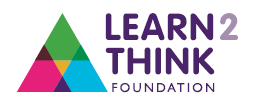
Learning to think, learning how to learn, is an important tool in helping all individuals adapt to a changing and increasingly complex world.
Critical thinking fosters resilience, empathy, flexibility of thinking and self confidence. Such skills offer the best immunisation against misinformation, bullying and indoctrination.
Developing thinking skills enables learners to gain a deeper understanding of topics, to be more critical about evidence, to think flexibly and to make reasoned judgements and decisions rather than jumping to conclusions. These qualities are needed both in school and in the wider world.
If we wish to raise generations that understand the breadth of the challenges that the 21st century has to offer, politically, socially, environmentally and economically, and that will work together to find collaborative, caring and creative solutions to these challenges - we have to give them the tools to do so.
There are a number of approaches to encourage children to learn differently, from Montesorri to Steiner, but the key to success lies in finding an approach which enables all children to learn these skills while experiencing a traditional curriculum, irrespective of the school that they attend. The idea is to spread these skills throughout the state school system, ensuring that children are given the tools they need to compete in an increasingly complex world.
It's important that we raise a generation of independent thinkers, people who are not afraid to ask why, and prepared to keep asking until we achieve change. We can do this through harnessing the natural curiosity that children are born with, and using that to help build a more equal and sustainable society.
Critical thinking fosters resilience, empathy, flexibility of thinking and self confidence. Such skills offer the best immunisation against misinformation, bullying and indoctrination.
Developing thinking skills enables learners to gain a deeper understanding of topics, to be more critical about evidence, to think flexibly and to make reasoned judgements and decisions rather than jumping to conclusions. These qualities are needed both in school and in the wider world.
If we wish to raise generations that understand the breadth of the challenges that the 21st century has to offer, politically, socially, environmentally and economically, and that will work together to find collaborative, caring and creative solutions to these challenges - we have to give them the tools to do so.
There are a number of approaches to encourage children to learn differently, from Montesorri to Steiner, but the key to success lies in finding an approach which enables all children to learn these skills while experiencing a traditional curriculum, irrespective of the school that they attend. The idea is to spread these skills throughout the state school system, ensuring that children are given the tools they need to compete in an increasingly complex world.
It's important that we raise a generation of independent thinkers, people who are not afraid to ask why, and prepared to keep asking until we achieve change. We can do this through harnessing the natural curiosity that children are born with, and using that to help build a more equal and sustainable society.
